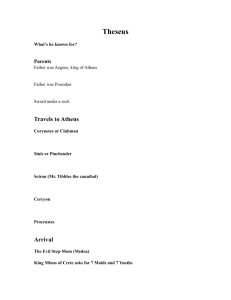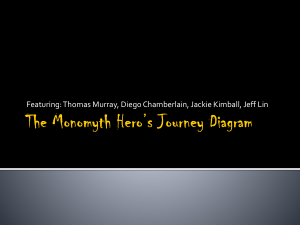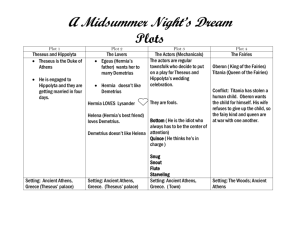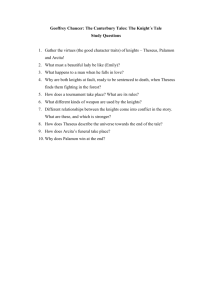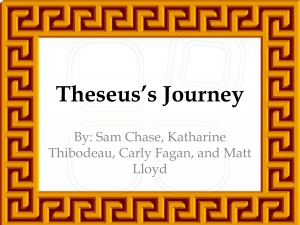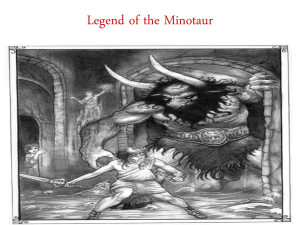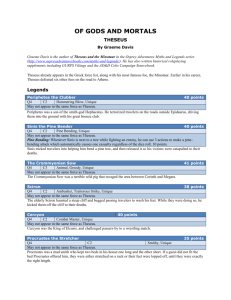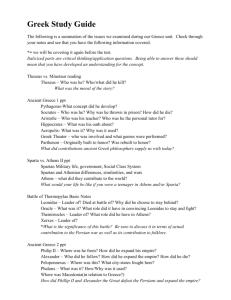The Story of Theseus
advertisement
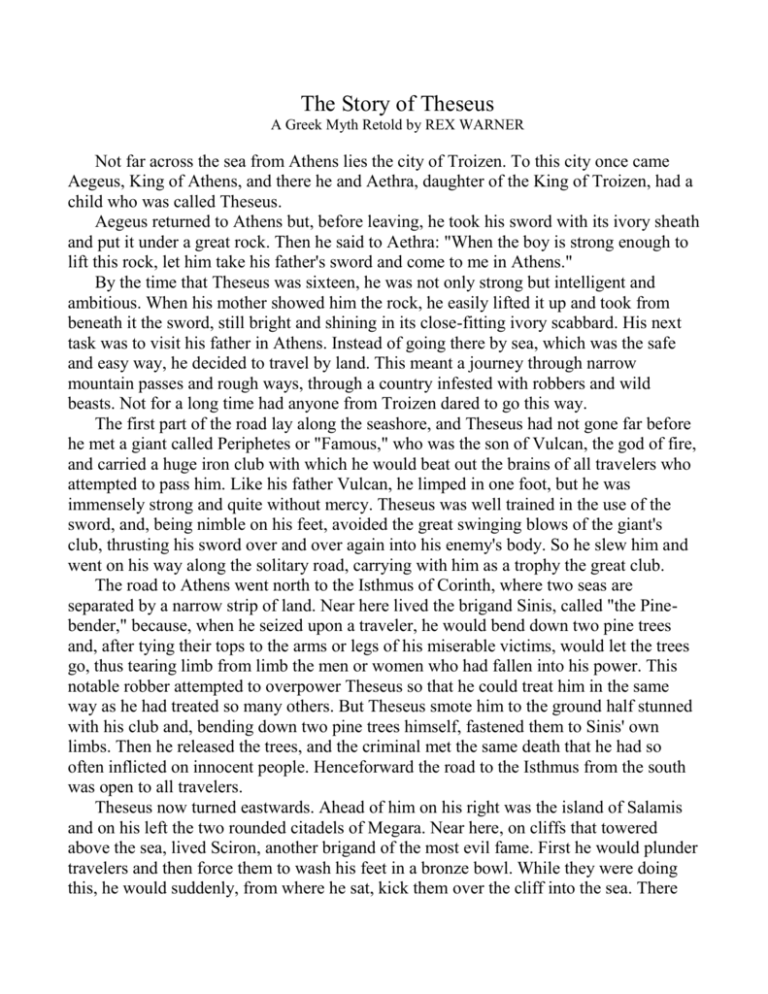
The Story of Theseus A Greek Myth Retold by REX WARNER Not far across the sea from Athens lies the city of Troizen. To this city once came Aegeus, King of Athens, and there he and Aethra, daughter of the King of Troizen, had a child who was called Theseus. Aegeus returned to Athens but, before leaving, he took his sword with its ivory sheath and put it under a great rock. Then he said to Aethra: "When the boy is strong enough to lift this rock, let him take his father's sword and come to me in Athens." By the time that Theseus was sixteen, he was not only strong but intelligent and ambitious. When his mother showed him the rock, he easily lifted it up and took from beneath it the sword, still bright and shining in its close-fitting ivory scabbard. His next task was to visit his father in Athens. Instead of going there by sea, which was the safe and easy way, he decided to travel by land. This meant a journey through narrow mountain passes and rough ways, through a country infested with robbers and wild beasts. Not for a long time had anyone from Troizen dared to go this way. The first part of the road lay along the seashore, and Theseus had not gone far before he met a giant called Periphetes or "Famous," who was the son of Vulcan, the god of fire, and carried a huge iron club with which he would beat out the brains of all travelers who attempted to pass him. Like his father Vulcan, he limped in one foot, but he was immensely strong and quite without mercy. Theseus was well trained in the use of the sword, and, being nimble on his feet, avoided the great swinging blows of the giant's club, thrusting his sword over and over again into his enemy's body. So he slew him and went on his way along the solitary road, carrying with him as a trophy the great club. The road to Athens went north to the Isthmus of Corinth, where two seas are separated by a narrow strip of land. Near here lived the brigand Sinis, called "the Pinebender," because, when he seized upon a traveler, he would bend down two pine trees and, after tying their tops to the arms or legs of his miserable victims, would let the trees go, thus tearing limb from limb the men or women who had fallen into his power. This notable robber attempted to overpower Theseus so that he could treat him in the same way as he had treated so many others. But Theseus smote him to the ground half stunned with his club and, bending down two pine trees himself, fastened them to Sinis' own limbs. Then he released the trees, and the criminal met the same death that he had so often inflicted on innocent people. Henceforward the road to the Isthmus from the south was open to all travelers. Theseus now turned eastwards. Ahead of him on his right was the island of Salamis and on his left the two rounded citadels of Megara. Near here, on cliffs that towered above the sea, lived Sciron, another brigand of the most evil fame. First he would plunder travelers and then force them to wash his feet in a bronze bowl. While they were doing this, he would suddenly, from where he sat, kick them over the cliff into the sea. There their bodies were devoured by a large tortoise who for many years had swum around the base of the cliffs, fed continually on human fleshy. Theseus had heard of this cruel murderer, and when he met him in the narrow pathway over the rocks, he pretended to be willing to wash his feet. But, just as Sciron was preparing, with one blow of his foot, to hurl him into the sea, Theseus gripped his foot firmly, swung him round and, grasping him by the shoulder, theew him into the sea himself. Far below he saw the sea turn white as the body fell, and then he saw the back and head of the monstrous tortoise coming to the surface for his last meal of men's flesh. There was yet another wicked enemy to strangers whom Theseus treated in the same way as he had treated others. This was the strong man Procrustes who wrestled with all travelers and, when he had overcome them, would make them lie down on his bed. If their bodies were too short for the bed, he would rack their arms and legs with weights or hammer them out until they were long enough to fit. If they were too tall to lie on it, he would chop pieces off their limbs until they fitted exactly. At last this cruel robber had met his match. Theseus, after wrestling for long with him, threw him to the ground. Then he bound him to his own bed and, though here his body was exactly the right length, he cut off his head. Theseus was now close to Athens and had conquered all the human enemies whom he would meet on his way. What he met with next was a monstrous sow, which for long had terrorized the villagers in the country districts near Athens itself. Some say that this sow had been the mother of the great boar that Meleager killed in Calydon. At all events she was an immense animal, strong and savage, and used to root up the crops with her snout, drag down the vines from their supports and kill and eat young children and defenseless old people. Theseus went out alone to hunt this sow. He avoided the animal's furious charges and each time she swept past him he planted a hunting spear in her back. Finally, with a blow of the club he had taken from Periphetes he killed the sow and enabled the country people to continue unmolested their work in the fields. Soon afterwards from the top of a hill he saw below him the city of Athens which poets have called "violet crowned," because, as the sun sets, the ring of rocky hills that surround the city turns from shade to shade of violet and amethyst. He drew nearer and came to the great stone walls of the citadel, or Acropolis, where his father's palace stood. Having accomplished such brave deeds on his journey, he was confident that his father Aegeus would receive him kindly. As it happened, however, he very nearly met his death at his father's hands. The enchantress Medea had fled to Athens after her cruel murder of her own children and of the royal house of Corinth. In Athens Aegeus had protected her, had made use of her magic powers and by her had had a child. Medea, by her enchantments, knew that Theseus was now on his way to Athens. She was jealous of the fame that he had won already and she wished her own son to have the throne of Athens after Aegeus's death. She therefore pretended that she had discovered by her magic arts that the stranger who would shortly arrive in Athens was a criminal who had come to murder the king. She instructed Aegeus to give him, as soon as he arrived and without getting into conversation with him, a cup of wine into which she had put deadly poisons. Aegeus believed her, and, when Theseus arrived and stood before him, he himself handed to his son the poisoned cup. Theseus raised it to his lips and was about to drink when, at the last moment, Aegeus noticed at Theseus's side the ivory scabbard of the sword he had left longs ago under the rock in Troizen. He dashed the cup from the young man's lips and folded him in his arms. Then he turned in anger upon Medea who had so nearly made him the murderer of his own son. But Medea, knowing that this time no excuses could save her, had mounted into her winged chariot and disappeared through the air. This was the last of her wicked deeds. Some say that she returned to her country of Colchis and became reconciled with her family, but nothing really certain is known about this. Even now Theseus and his father were not entirely secure in the land of Athens. First there was the hero Pallas who, with his fifty sons, tried to seize the kingdom from Aegeus. They made a treacherous attack on Theseus, but he, fighting back at them with a small company of friends, killed every one of them. Then, at the time when Theseus reached Athens, the whole plain to the north, the plain of Marathon, where later the great army of the Persians was destroyed, was ravaged by a great bull. The people of the district had turned in v- ain to their king for help. No man or body of men dared encounter this fierce tremendous animal. Theseus went out to Marathon alone. He captured the bull alive, bound it with ropes and brought it back to Athens. There, after a triumphant procession through the streets, he sacrificed it to Minerva, the goddess of the city. The joyful throngs of people acclaimed him gladly as their future king and as a hero who had driven from their country and its surroundings both robbers and wild beasts. No one in the world, they said, except Hercules, had done such deeds. Use this chart to keep track of all the people Theseus meets on the first stages of his journey. Character Part of Pattern Information that tells more about this character
